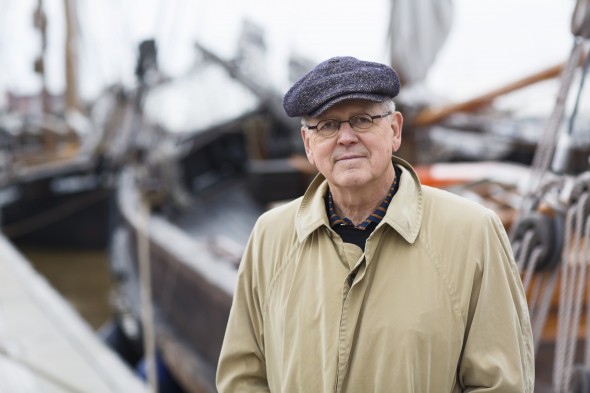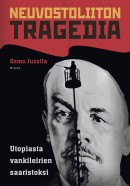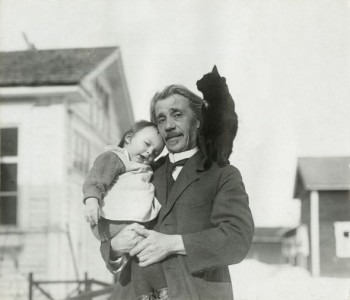Search results for "2010/02/2011/04/2009/10/writing-and-power"
Like father, like daughter
31 March 1999 | Archives online, Fiction, Prose
Extracts from Tom Tom Tom (Gummerus, 1998). Introduction by Soila Lehtonen
A father and daughter in a hospital back garden
Bits of nail flick to the ground as Kokko cuts Tom’s nails, leaving rather brittle nail-ends among the lichen. In the middle of the hospital afternoon they’ve made their way down to the little park, to care for the hands of both of them, all four.
In the days before Africa Tom used to nurse Kokko on the living-room sofa and cut the nails on her most difficult hand, pushed the cuticles back and taught her the care that ought to be taken of nails, or she’d have smarting and pain round the cuticles. Kokko used to plead to be taken into his nail cutting lap oftener than she should, even when she’d really have preferred to grow longer nails. More…
At the sand pit
30 September 1985 | Archives online, Fiction, Prose

Antti Tuuri. Photo: Jouni Harala
‘After nearly 40 years of observing the Ostrobothnians, I am convinced that they have certain characteristics which explain the historical events that took place there and which also shed light on the region today. I do not know how these characteristics develop, but it appears that heredity, economic factors and even the landscape form the nature of people. Everywhere people who live in the plains are different from those who dwell in the mountains, and from those who fish the archipelagos,’ writes the author Antti Tuuri, himself an Ostrobothnian.
Antti Tuuri’s Pohjanmaa (‘Ostrobothnia’, 1982), which last January was awarded the Nordic Prize for Literature, has now been translated into each language of the Nordic countries. Tuuri’s novel describes the events of one summer day in Ostrobothnia, on the west coast of Finland, where a farming family, the Hakalas, has gathered for the reading of the will of a grandfather who emigrated to the United States in the 1920s.
The inheritance itself is insignificant, but it has brought together the four grandsons, with their wives and children. The story is narrated from the point of view of one of the brothers. The women of the family remain inside while the men take out an automatic pistol which has been kept hidden away since one of them smuggled it home from the Continuation War. The men go off to a sand pit to do some shooting and to drink some illegal home brew. There they meet their former schoolteacher, who joins in with their drinking and shooting. Some surprising events take place as the day’s action unfolds, and Tuuri’s narrator views them in an unsentimental way, describing them matter-of-factly and at times with ironic humour. The men recall the violent history of Ostrobothnia, the years of the Civil War and the right-wing Lapua movement of the 1930s.
The Nordic Prize jury commented that the novel ‘portrays the breaking up of the old society, and conflicts between generations as well as between men and women.’ Tuuri has constructed his novel on conflicts, and the result is a highly dramatic narrative.
![]()
An extract from Pohjanmaa (‘Ostrobothnia’)
A Finnish hound dog came out of the woods just beyond the sandpit, stopped at the edge of the pit and started to bark at us. The boys quickly began putting the weapon together. Veikko yelled that you were allowed to shoot a dog running loose in the woods out of hunting season. He kept asking me for cartridges; he’d shoot the dog right away, before it could tear to pieces the young game birds that couldn’t fly yet. I told him to shut up. Seppo finished putting the automatic pistol together and gave it to me. I ran to the car, put the gun down on the floor in front of the back seat and tossed a blanket over it.
When I got back, I saw the teacher coming out of the woods over by the pit. He snapped a leash on the dog and started towards us through the pine grove. The boys sat down around the campfire and began taking swigs of home brew from their cups. More…
True or false?
An extract from the novel Toiset kengät (‘The other shoes’, Otava, 2007). Interview by Soila Lehtonen
‘What is Little Red Riding Hood’s basket like? And what is in it? You should conjure the basket up before you this very moment! If it will not come – that is, if the basket does not immediately give rise to images in your minds – let it be. Impressions or images should appear immediately, instinctively, without effort. So: Little Red Riding Hood’s basket. Who will start?’
Our psychology teacher, Sanni Karjanen, stood in the middle of the classroom between two rows of desks. Everyone knew she was a strict Laestadian. It was strange how much energy she devoted to the external, in other words clothes. God’s slightly unsuccessful creation, a plump figure with pockmarks, was only partially concealed by the large flower prints of her dresses, her complicatedly arranged scarves and collars. Her style was florid baroque and did not seem ideally suited to someone who had foresworn charm. Her hair was combed in the contemporary style, her thin hair backcombed into an eccentric mountain on top of her head and sprayed so that it could not be toppled even by the sinful wind that often blew from Toppila to Tuira. More…
Poems
31 December 1977 | Archives online, Fiction, poetry
Poems from Tanssilattia vuorella (’The dancing-floor on the mountain’). Introduction by Pekka Tarkka
I
Having studied
Krinagoras
the flower of Philippos’ wreath
under the vaults in a cool library far away in silence
I have gone to see the boat how it is coming on
whether it will be in working order next summer
we have no strong men
have sat on the beach-hut steps thinking of him
the politician the negotiator:
poetry is a holding of council, an art of negotiation More…
Ordinary people
30 June 1990 | Archives online, Fiction, poetry
Poems from Vaikka aamuun on vielä aikaa (‘Though it’s still a long time till morning’, 1989) Introduction by Risto Rasa
This time
this time of consensus
that teaches
the poor to love the prosperous,
the bossed to love the bossers
the kicked to love the kickers
and all of us to love humility
obedience and biddability
before the hingdom, the power and the glory:
this time
cries out for a tearer-up,
calls for a muster
of thousands and thousands
of serious and honest busters. More...
Troubled waters
31 March 2005 | Archives online, Fiction, Prose
Extracts from the novel Den amerikanska flickan (‘The American girl’, Söderströms, 2004). Introduction by Pia Ingström
Doris Night&Sandra Day, Sandra Night&Doris Day: those were their alter ego identities for the game, which also involved the smiles they’d practised in front of the mirror at the bottom of the empty swimming pool, in the house in the muddier part of the woods.
‘We’re two clairvoyant sisters,’ said Doris Flinkenberg. ‘We got that way because of tragic circumstances. The poltergeist phenomenon. Do you know what that is?’
Sandra Wärn shook her head, but looked expectantly at Doris, the perennial crossword – solver, with dictionary to hand, who continued. ‘It’s when the innocent child has been badly abused and has developed supernatural powers in order to survive. Powers to see behind what’s there,’ Doris Flinkenberg explained. ‘To see what no one else can see.’
‘You and I, Sandra,’ Doris confirmed. ‘We were badly abused. I with my scars and you with your tragic family background, your mother and her lover, all of that. You and I, Sandra, we know what it is to suffer.’ More…
Osmo Jussila: Neuvostoliiton tragedia. Utopiasta vankileirien saaristoksi [The tragedy of the Soviet Union. From utopia to Gulag Archipelago]
31 January 2013 | Mini reviews, Reviews
 Neuvostoliiton tragedia. Utopiasta vankileirien saaristoksi
Neuvostoliiton tragedia. Utopiasta vankileirien saaristoksi
[The tragedy of the Soviet Union. From utopia to Gulag Archipelago]
Helsinki: Otava, 2012. 448 p., ill.
ISBN 978-951-1-26521-4
€32.80, hardback
The acclaimed Russian and Soviet history scholar Osmo Jussila examines the early history of the Soviet Union from a fresh perspective. He shows how, in the years following the 1917 Revolution, an originally positive idea for a better society turned into a bureaucratic tyranny. The Soviet Union’s strong man V.I. Lenin created the Bolshevist Party as a paramilitary organisation which managed to seize power in October 1917. Even in the early years of Soviet power the ‘Red Terror’ crushed its opponents with executions and the establishment of prison camps. Although Lenin was a good professional revolutionary, he was almost incapable of building a new society: his solutions were often cruel, arbitrary and hasty. Jussila’s general view of Lenin is in line with the ideas that are familiar from more recent historical research, but the author also focuses and deepens his analysis to provide an essentially complete picture of Soviet Russia’s chaotic development and of Lenin’s role in the formation of the oppressive Soviet state.
Translated by David McDuff
In defence of small people
15 November 2012 | Non-fiction, Reviews

Teuvo Pakkala with grandson Teuvo-Pentti and Mirri the cat. Photo: F. Suomela / Otava, 1922
The best-known work of author Teuvo Pakkala (1862–1925) is Tukkijoella (‘On the log river’, 1899), Finland’s most-performed play. The song-studded comedy set in motion a phase of ‘logger romanticism’ in Finnish literature which later spread to film as well. Like the cowboy of the old west, the wandering lumberjack became the prototype for the Finnish masculine adventurer.
The entertaining musical play was a blockbuster. Pakkala’s works of more literary significance, however, encountered more difficulty. His short story collections on the lives of children – Lapsia (‘Children’, 1895) and Pikku ihmisiä (‘Little people’, 1913) – were greeted with flattering acclaim, but marked the author as hopelessly ‘effeminate’, as the critics put it. The stories were read as a kind of child-rearing guide, or even as tales for children. It wasn’t until much later, in the second half of the 20th century, that these psychological studies of children were re-examined as early gems of the short story form by a contemporary of Freud. More…
Are we stupid or what?
14 October 2011 | Non-fiction, Tales of a journalist
 Are we dumbed down by the Internet? Jyrki Lehtola takes a look at who might be to blame
Are we dumbed down by the Internet? Jyrki Lehtola takes a look at who might be to blame
Because I am not a historian and Googling this topic would take more than two clicks, I do not know whether Gutenberg was accused of ruining the future of young people and making adults even stupider.
There would have been reason to. The invention of the printing press took us away from what is truly important. The world was better before Gutenberg.
People knew themselves and each other; they were connected to nature and what really matters. After Gutenberg invented the printing press, those poor people were forced to read books, creating an ever-worsening state of helplessness. More…
The gender of the soul
Scenes from the play Kuningatar K / Queen C
Characters:
Christina, the Queen
Friend
The Queen Mother
Karl Gustav, the Count [Christina’s suitor, the King-to-be]
Descartes, philosopher
Official
Man
The King
Oxenstierna, Per Brahe
A choir of midwives
The play can be performed with six actors (3 female, 3 male). Other ways of dividing the roles are possible. All stage directions may be altered.
1. Prologue
The eels’ court
CHRISTINA
If eels had a court then a great female eel would sit in the centre and the little males would writhe about like seaweed around the throne. However they would not be envious of the queen, because they would know that if they swam up into rivers and lakes, into fresh waters, they themselves would gradually become females, great and heavy, and would be able to rule and close into their great embrace all the small little gentlemen. They just have to wait.
KARL GUSTAV
I don’t know. What I do know is that a great black eel, as thick as a rope, was pulled out of the well last night and the Queen looked at its silver stomach and its thrashing tail, but the eel looked the Queen in the eyes and in the heart and since then she has never been the same. More…
Song without words
30 June 2003 | Archives online, Fiction, Prose
Extracts from the novel Näiden seinien sisällä me emme näy (‘Within these walls we are invisible’, Tammi, 2003). Introduction by Maria Säntti
During the night the child was with Ellen, in her dreams. Ellen was turning over a pack of cards, the king rose, she followed the course of events from outside as it proceeded without her. The child was resting, settled, repeating her profile. The world was beautiful and all of them together in the face of death. Time stood still. A nocturnal bird sang through the rain. Ellen awoke, at night time does not stop; she thought, stepping from one memory to another. Everything was unfinished. It was a watchful night before words.
In the morning time rushed forward. Brain chemistry, Ellen thought as she lay in bed, mere brain chemistry. Then the train of thought broke off, a bright light suddenly snapped on as Tapani pressed the bedroom switch to search the wardrobe for a clean shirt. Ellen got up quickly, during the night the child had grown into something of which she knew nothing. She began to make porridge, and watched as the child opened like a plant toward the light. More…
One hell of a time
31 December 1997 | Archives online, Fiction, Prose
Extracts from Lanthandlerskans son (‘Country shopkeeper’s son’, Söderströms, 1997). Brooklyn Bridge, Christmas Eve: Otto, a Finland-Swede, attempts to start a new life in 1930s America, where swindlers and even gangsters can, he finds, be duped – even Al Capone. Otto’s grandson listens to his story on tape
I have always loved that sight. A city that you see from the air at night, all lit up. It’s’ beautiful – and at the same time so frightening. I don’t really know how to describe it.
Well, it was Christmas Eve. I was wandering around New York. I had eaten at an automat. Do you know what that is? They don’t exist any more, but in the Twenties and Thirties they were common in America. It’s a cafe, but they didn’t have any staff or waiters, instead the walls were full of little glass boxes where the food was on display. You could select what you wanted – sandwiches and pies and salads, anything. Then you put your nickels and dimes in a slot beside the box and the glass opened and’all you had to do was take out the plate. I was fond of the automats. I liked just sitting there and watching other people eat, no one bothered about you, you were left alone and that suited me. When I’d finished eating I went outside again and somehow or other I wandered upon to Brooklyn Bridge. There was a lot of traffic, people were on their way home. Well, just as I was walking there alone in the company of my thoughts I heard someone shouting ‘Help! Help me!’ More…
Daddy dear
30 June 2004 | Archives online, Fiction, Prose
Extracts from the novel Vanikan palat (‘Pieces of crispbread’, Otava, 2004). Interview by Soila Lehtonen
Dad’s at the mess again. Comes back some time in the early hours. Clattering, blubbing, clinging to some poem, he collapses in the hall.
We pretend to sleep. It’s not a bad idea to take a little nap. After a quarter of an hour Dad wakes up. Comes to drag us from our beds. Crushes us four sobbing boys against his chest as if he were afraid that a creeping foe intended to steal us. We cry too, of course, but from pain. Four boys belted around a non-commissioned officer is too much. It hurts. And the grip only tightens. Dad whines:
‘Boys, I will never leave you. Dad will never give his boys away. There will be no one who can take you from me.’ More…
